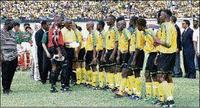Daraine Luton, Sunday Gleaner reporter 
Then Prime Minister P.J. Patterson is introduced to the Jamaican team before the match on November 16, 1997, by captain Warren Barrett. - File
It has been a long while since the heart of the nation has throbbed with the pulsating beat that brought the country together 10 years ago.
"Not even the Cricket World Cup was as powerful," a female football fan says.
Understandably, few moments in the life of Independent Jamaica can compare to Jamaica's 'Road to France' campaign.
On Friday, Jamaica celebrated 10 years of its historic qualification for the football World Cup in France. No other English-speaking Caribbean country had achieved the feat, which came on November 16, 1997 - the day the Reggae Boyz drew 0-0 with Mexico at 'The Office'.
Warren Barrett was the captain of the Reggae Boyz at the time.
"It was a historic occasion. That's how great it was for this nation. It is really hard to explain in words how special it was," Barrett tells The Sunday Gleaner.
Police records indicate that murders, while not vanishing in the glory days, took a nose dive. Two persons were murdered on qualification day and three the following day, in a year in which 1,038 persons were murdered in Jamaica.
"We united the nation. Everyone was one and it was such a great feeling," Barrett says.
"It was one of the most important days in my life. We had accomplished what few of us had dreamt about," the former custodian adds.
Over 35,000 persons crammed into the National Stadium for the game. Others watched on tele-vision at homes, from pubs, or by the streetside.
Marlon, a football fan, remem-bers the moment as if it were yesterday.
"I was at the Stadium and I could not hear the whistle. I didn't hear the final whistle. It was so noisy, it was special," the 25-year-old Kingstonian tells The Sunday Gleaner.
Immediately following Jamaica's qualification for the World Cup, then Prime Minister P.J. Patterson declared a public holiday for November 17. Jamaica also made a commemorative Reggae Ball for $9 million. (Its whereabouts is a mystery.)
Road to France
Captain Horace Burrell, who built the Road to France with the input of Brazilian coach René Simoes as technical director, says it was a most memorable day.
"Having heard the final whistle signalling the end of the game and realising that the score was nil-all and Jamaica had qualified for the first time for the World Cup finals in France in June, 1998, for a split second, I thought that I had travelled in a spacecraft and landed safely on the moon," Burrell recounts.
For Barrett too, the moment was magic.
"I remember people on the streets celebrating for almost the entire night in every town. It was just a great day for the nation. Everybody, irrespective of colour, race or class, came together," the man they called 'Boopie' recalls.
Sadly, two Reggae Boyz are not here celebrating the moment. Defender Stephen 'Shorty' Malcolm died in a motor vehicle accident on January 28, 2001. He had the sweat of national fight on his body, having hours before represented Jamaica in a friendly international against Bulgaria. He was heading home to Montego Bay, St. James.
Reggae Boyz current interim coach Theodore Whitmore was a passenger in that car, which was being driven by Malcolm.
Last year, another team member, Peter 'Jair' Cargill, also perished in a motor vehicle accident.
Barrett wishes they were here to celebrate the 10 years of qualification.
"May God rest their souls. They do cross my mind very often. They were great servants of the national team and they were great friends, and I miss them dearly," he reminisces.

